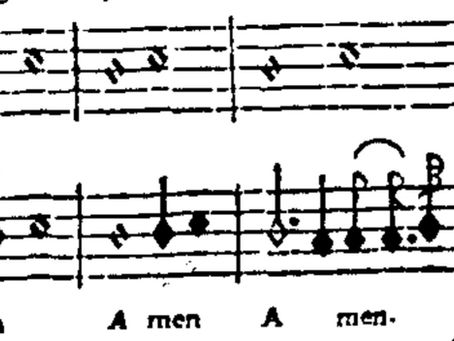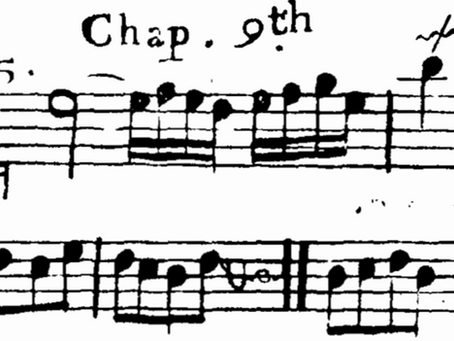top of page
Reimagining Historical Voices
Search


Robert Gjerdingen on the Role of Solfeggi in Baroque Vocal Pedagogy
‘Although manuscript collections of solfeggi were centerpieces in the training of musicians in the days of Bach and Mozart, today the...

Tim Braithwaite


Georg Falck on the use of Extemporised Florid Ornaments and Trills in an Ensemble Setting (1688)
‘Although they are set only in the system of the cantus, these examples of accentus and variation of intervals can be used in the other...

Tim Braithwaite


G. Batista Doni on the 'Plasma' of the Ancients in Modern Practice (1763)
'The Strascino [slide] (which is the continued plasma of the Ancients, and which is done by raising or lowering continuously the voice,...

Tim Braithwaite


Two Comments on Ensemble Singing by Joan Albert Ban (1642)
III. Diminution Diminution occurs when larger notes are broken into many parts by the smaller ones in motion. The which must not...

Tim Braithwaite


Vincenzo Manfredini on the use of Ornaments in Recitative (1797)
‘A great defect into which some of the best modern singers have fallen is that of having introduced florid ornaments into recitative,...

Tim Braithwaite


Pietro Reggio on Teaching the Trillo (1677)
‘Now let us proceed to teach a man to Trillo, and what he must do, for to come to do it well. The first Trial is as follows. Let any...

Tim Braithwaite


An Anonymous Set of Instructions for Ornamenting Plainchant (c.1475-1525)
[fol. 22r.] Chapter two: of the definition and the division of melodía Melodía is to adorn and to grace the sounds of plainchant. Melodía...

Tim Braithwaite


Dr. Zechariah Buck’s (1798-1879) Methods of Teaching Choristers at Norwich Cathedral
The time table of daily duty was, 9 to 9.45, scale practice; 10 to 11, morning service; 11 to 12.30 or 1, music practice; 2 to 3.45,...

Tim Braithwaite


Bovicelli on the Graceful Placement of Certain Syllables (1594):
‘As for the disposition of the words under the notes, it is necessary to take great care to set them so well, that not only no barbarism...

Tim Braithwaite


Bottrigari on both Ensemble Ornamentation and ‘Odious’ (‘odiosa’) Improvised Counterpoint (1594)
‘[Alemanno Benelli:] But because of the presumptuous audacity of performers who try to invent passaggi, I will not say sometimes, but...

Tim Braithwaite


Conrad von Zabern on those who Deviate from Notated Plainchant Melodies (1474):
‘To sing with fidelity... is to sing so that anyone of those singing together should remain in the form of those notes that were...

Tim Braithwaite


English Psalm Singers ‘Tearing with their Throats one Wretched Stave into an Hundred Notes’: (1708)
‘Then out the People yawl an hundred Parts, Some roar, some whine, some creak like the Wheels of Carts; Such Notes the Gam-ut yet did...

Tim Braithwaite


The Practices of ‘Lascivious’ Church Musicians as Described by Heinrich von Nettesheim (1532)
‘Today, music has such great license in churches that even along with the canon of the mass certain obscene little ditties sometimes have...

Tim Braithwaite


Adrianus Petit Coclico on the Art of Singing as (Supposedly) Taught by Josquin Dez Prez (1552):
‘To teach the art of singing well and elegantly to a boy, I advise first that he choose a teacher who sings pleasantly and sweetly with a...

Tim Braithwaite


Adriano Banchieri’s ‘Hundred Passaggi’:
‘The hundred passaggi above, all having been printed in various works by modern authors, have been assembled with much study and...

Tim Braithwaite


Pietro Reggio on the Sliding ‘Accent’ (1677)
‘Now let us take notice, of singing long Notes Gracefully. Note the following Example. The first Note must begin softly, and then...

Tim Braithwaite


A Comparison Between Cathedral Singing and the Singing of David’s Psalms (1644)
Davids Psalms sung in our English Meeter differ much from Cathedrall singing, which is so abominable, in which is sung almost every...

Tim Braithwaite


Reminiscences of a Cacophonous (!) way of ‘Singing on the Book’ in Early 19th-Century France
‘I know of no musician today who has any idea what it means to sing on the book. It was an improvised and simultaneous melody [chant]...

Tim Braithwaite


Tosi on the Excesses of Modern (1723) Singers, and the Patience of the Waiting Orchestra
Ԥ 5. Every Air has (at least) three Cadences, that are all three final. Generally speaking, the Study of the Singers of the present...

Tim Braithwaite


Do Tosi and his commentators prefer too many or too few ornaments?
I was recently flicking through an instruction book aimed at teaching modern singers how to ornament eighteenth-century repertoire, and I...

Tim Braithwaite
bottom of page
